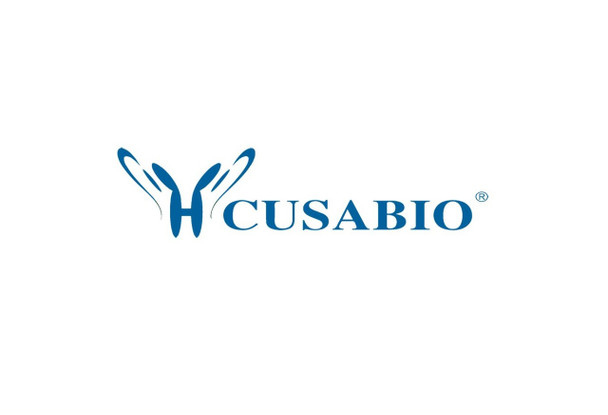Cusabio Mouse Recombinants
Recombinant Mouse Ephrin-B3 (Efnb3), partial | CSB-EP007467MO
- SKU:
- CSB-EP007467MO
- Availability:
- 13 - 23 Working Days
Description
Recombinant Mouse Ephrin-B3 (Efnb3), partial | CSB-EP007467MO | Cusabio
Alternative Name(s): Efnb3Ephrin-B3
Gene Names: Efnb3
Research Areas: Others
Organism: Mus musculus (Mouse)
AA Sequence: LSLEPVYWNSANKRFQAEGGYVLYPQIGDRLDLLCPRARPPGPHSSPSYEFYKLYLVEGAQGRRCEAPPAPNLLLTCDRPDLDLRFTIKFQEYSPNLWGHEFRSHHDYYIIATSDGTREGLESLQGGVCLTRGMKVLLRVGQSPRGGAVPRKPVSEMPMERDRGAAHSAEPGRDTIPGDPSSNATSRGAEGPLPPPSMPA
Source: E.coli
Tag Info: N-terminal 6xHis-tagged
Expression Region: 28-227aa
Sequence Info: Extracellular Domain
MW: 26 kDa
Purity: Greater than 90% as determined by SDS-PAGE.
Relevance: Cell surface transmbrane ligand for Eph receptors, a family of receptor tyrosine kinases which are crucial for migration, repulsion and adhesion during neuronal, vascular and epithelial development. Binds promiscuously Eph receptors residing on adjacent cells, leading to contact-dependent bidirectional signaling into neighboring cells. The signaling pathway downstream of the receptor is referred to as forward signaling while the signaling pathway downstream of the ephrin ligand is referred to as reverse signaling. May play a pivotal role in forebrain function. Binds to, and induce the collapse of, commissural axons/growth cones in vitro. May play a role in constraining the orientation of longitudinally projecting axons.
Reference: Mass-spectrometric identification and relative quantification of N-linked cell surface glycoproteins.Wollscheid B., Bausch-Fluck D., Henderson C., O'Brien R., Bibel M., Schiess R., Aebersold R., Watts J.D.Nat. Biotechnol. 27:378-386(2009)
Storage: The shelf life is related to many factors, storage state, buffer ingredients, storage temperature and the stability of the protein itself. Generally, the shelf life of liquid form is 6 months at -20?/-80?. The shelf life of lyophilized form is 12 months at -20?/-80?.
Notes: Repeated freezing and thawing is not recommended. Store working aliquots at 4? for up to one week.
Function: Cell surface transmembrane ligand for Eph receptors, a family of receptor tyrosine kinases which are crucial for migration, repulsion and adhesion during neuronal, vascular and epithelial development. Binds promiscuously Eph receptors residing on adjacent cells, leading to contact-dependent bidirectional signaling into neighboring cells. The signaling pathway downstream of the receptor is referred to as forward signaling while the signaling pathway downstream of the ephrin ligand is referred to as reverse signaling. May play a pivotal role in forebrain function. Binds to, and induce the collapse of, commissural axons/growth cones in vitro. May play a role in constraining the orientation of longitudinally projecting axons.
Involvement in disease:
Subcellular Location: Membrane, Single-pass type I membrane protein
Protein Families: Ephrin family
Tissue Specificity: Expressed on lateral floor plate cells, specifically on commissural axon segments that have passed through the floor plate. Expressed in cells of the retinal ganglion cell layer during retinal axon guidance to the optic disk (PubMed:9484836, PubMed:10704386). Expressed in myogenic progenitor cells (PubMed:27446912).
Paythway:
Form: Liquid or Lyophilized powder
Buffer: If the delivery form is liquid, the default storage buffer is Tris/PBS-based buffer, 5%-50% glycerol. If the delivery form is lyophilized powder, the buffer before lyophilization is Tris/PBS-based buffer, 6% Trehalose, pH 8.0.
Reconstitution: We recommend that this vial be briefly centrifuged prior to opening to bring the contents to the bottom. Please reconstitute protein in deionized sterile water to a concentration of 0.1-1.0 mg/mL.We recommend to add 5-50% of glycerol (final concentration) and aliquot for long-term storage at -20?/-80?. Our default final concentration of glycerol is 50%. Customers could use it as reference.
Uniprot ID: O35393
HGNC Database Link: N/A
UniGene Database Link: UniGene
KEGG Database Link: KEGG
STRING Database Link: STRING
OMIM Database Link: N/A









